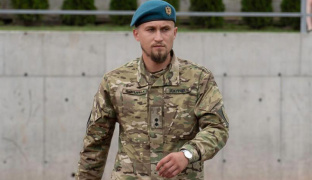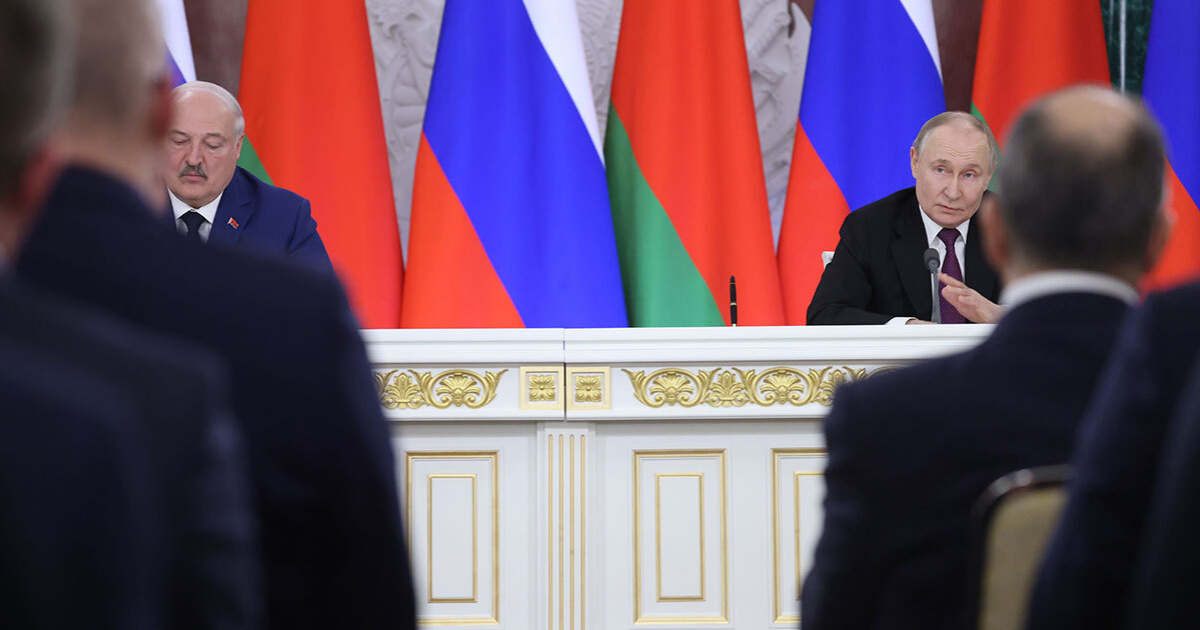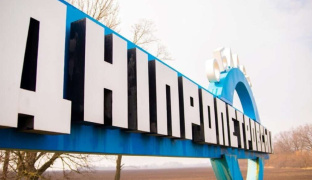"While you were rescuing animals and people from the flooded areas, the residents of Crimea were frantically collecting water in any available containers and making reserves. None of us expected any statements from the authorities about the consequences for us; we understood it perfectly well. It was enough to read the local social networks, chats and forums. No, you won't find any sympathy for Ukraine or anti-war messages there; you will see panic, anger and the realization that we will no longer have the peaceful life we had before. If not drones and missiles, then man-made disasters", - resident of occupied Sevastopol Ekaterina told OstroV two days after the tragedy in the Kherson oblast.
On the night of June 6, the dam of the Kakhovka Hydroelectric Power Plant, which was under the control of russian occupiers, was blown up.
While the russian authorities and propaganda blamed Ukraine for the dam explosion, Crimean collaborators started an information campaign under the slogan: "Nothing threatens Crimea, no one is panicking".
However, the destruction of the Kakhovka dam had a significant impact on the main source of fresh water on the occupied Crimean peninsula - the North Crimean Canal.
It is worth noting that prior to 2014, the water issue was solved by the mainland part of Ukraine, which supplied the Dnipro river water to Crimea through the North Crimean Canal. Prior to the annexation, it covered up to 85% of the peninsula's freshwater needs. After the russian occupation, the canal was blocked, and the peninsula relied only on water from local rivers, underground sources and reservoirs, which were catastrophically insufficient.
Things were so bad that in 2020, in some areas of Crimea, the third stage of water supply restrictions was introduced due to drought and the shallowing of reservoirs. Water was strictly supplied at specific times - in the morning (from 6:00 to 9:00) and in the evening (from 18:00 to 21:00). The local occupation authorities did not rule out the possibility that russia would declare a state of emergency regarding water supply in Crimea.
After the full-scale invasion and occupation of the Kherson oblast, russian military forces first blew up the dam that blocked the flow of water into the North Crimean Canal. Thus, Crimea was able to freely receive water from the Dnipro river. This event was presented by russian propagandists as one of the main objectives of the full-scale invasion.
In October 2022, vladimir putin boasted about how as a result of the so-called "special military operation" russian troops "opened the water flow to Crimea".
"Well, at one point - there are around two and a half million people living in Crimea - at one point they cut them off from the fresh water. Well, the troops had to come in and open the water flow to Crimea. Just as an example of the logic behind our actions", - stated the russian dictator.
Therefore, it is logical that immediately after the explosion of the Kakhovka Hydroelectric Power Plant, the local residents of Crimea recalled the "good old days" when water was supplied at specific times and began to stockpile it.
OstroV investigated how the Crimean occupiers are covering the consequences of the tragedy for the peninsula and what local residents are saying about it.
"The soothing statements" from the Crimean "authorities"
The Crimean occupiers did not rush to react to the explosion of the Kakhovka HPP; their initial morning messages were dedicated to "russian Language Day". However, a few hours later, they finally erupted with reassuring posts.
"Regarding the situation with the Kakhovka Hydroelectric Power Plant and the water supply to Sevastopol. The damage to the HPP will not affect the city's water supply. The city has its own reservoir, water reserves are at their maximum, and there are also backup water sources. I understand that now the Ukrainian propaganda outlets will try to exploit this situation to the fullest and spread lies and panic. So, once again, I remind you to trust only official sources of information", - wrote the so-called "governor" of Sevastopol, Mikhail Razvozhaev.
The russian "head" of Crimea, Sergey Aksyonov, also reassured that there is enough water and no threat of flooding.
"Regarding the situation related to the explosion of the Kakhovka Hydroelectric Power Plant. There is no threat of flooding in Crimea. However, there is a risk that the North Crimean Canal will become shallower. Currently, the water reserves in the canal are about 40 million cubic meters. Reservoirs, even those that were previously filled to 15-20%, are currently at around 80% capacity. There is more than enough drinking water. Efforts are being made to minimize water losses in the canal", - he reported.
The chairman of the russian State Committee for Water Resources of Crimea, Vladislav Maslyanik, claims that the Crimean peninsula is 100% provided with water. According to him, the North Crimean Canal on the territory of the peninsula is "operating normally".
Strangely enough, the most pessimistic forecast came from the appointed by invaders "head" of Nova Kakhovka, Vladimir Leontiev. According to his statement, the destruction of the gates of the Kakhovka Hydroelectric Power Plant in the Kherson oblast could still lead to problems with water supply to Crimea.
"The North Crimean Canal is designed in such a way that water flows naturally to Crimea. Currently, the water level in the Kakhovka reservoir, from which the canal is supplied, is rapidly decreasing. There may be problems with water supply", - he said.
According to local residents with whom OstroV managed to speak, the topic of the Kakhovka HPP blowing up is being downplayed and not being further developed. If it is mentioned in the local news, it is only in the context of blaming Ukraine.
"As for the possible consequences for Crimea, only positive messages and thoughts like 'the Ukrainians wanted to flood the peninsula and deprive it of water, but it didn't work out' are being spread. We've been through this before. We had explosions on the Crimean Bridge and drones in the center of Sevastopol, and they say everything is 'under control'. The authorities emphasize that there are currently water reserves. Okay, no one disputes that. But what will we do when these reserves run out? Not to mention who caused this tragedy and who benefits from it more", - resident of occupied Sevastopol Svetlana N. told OstroV.
However, despite the statements about the filled Crimean reservoirs, the occupying "authorities" have implemented water supply schedules in many Crimean cities starting from Wednesday, June 7. People were also urged to use water with maximum caution. However, this was explained as routine repair work "due to the reconstruction of main pipelines".
"Indeed, recently, local water utilities have been more active in publishing messages about water supply disruptions allegedly due to repair work. In Simferopol, things are more or less normal, and if there are any interruptions, they are brief. But my relatives in Yevpatoria complain that there was no water supply until noon on June 8-10 without a clear explanation of the reason. It may not seem like a significant problem, but it's already a warning sign, especially against the backdrop of reassuring messages from our authorities", - noted Ekaterina, a resident of Simferopol.
In addition, local residents have been complaining about the water quality in the first few hours after the Kakhovka HPP explosion.
"We are receiving information that water is being supplied according to the schedule in major cities, including reports of dirty water appearing there... In addition, at the initial stage, along with the water flowing through the North Crimean Canal, there is water carrying household waste and other contaminants. This can lead to various infectious diseases in Crimea", - said Eskander Bariyev, Chairman of the Board of the Crimean Tatar Resource Center.


Photos from local social media
The National Resistance Center of Ukraine also reported that serious problems with water supply arose in temporarily occupied Crimea after the blowing up of the Kakhovka Hydroelectric Power Plant carried out by the russians.
"At the same time, moscow curators instructed the leader of the occupational administration of the peninsula, Aksyonov, to hide information about the critical situation. The occupiers do not have a clear plan how to solve the problem of providing fresh water to the peninsula's residents", - stated representatives of the National Resistance Center.
After several days, information about the possible consequences of the HPP’s explosion for Crimea began to appear in local media.
For example, Lyudmila Radchenko, the "deputy director for scientific work of the Agricultural Research Institute of the republic", stated that most agricultural crops in occupied Crimea, including rice and sugar beets, are at risk due to the decrease in the water level in the North Crimean Canal following the destruction of the Kakhovka HPP.
"Rice, first and foremost, is definitely at risk. Then sugar beets, which are strategically important today. Several enterprises in Crimea grow sugar beets for seeds, and it is currently entering the flowering phase. This is the stage when it needs to be irrigated very frequently. Without irrigation, it will be impossible to obtain a seed harvest", - she said.
The General Staff of the Armed Forces of Ukraine explained the invaders’ suppression of information about the destruction of the HPP by their concern about possible panic among the local population.
Mikhail, a real estate agent residing in Simferopol, explained OstroV that the "authorities" do not want to cause panic not only among the local population but also among potential tourists.
"The day after the explosion, we started seeing new cancellations of trips to Crimea. There were already very few of them, and now even the few reservations that were made are being canceled or postponed. It's one thing to endure queues on the Crimean Bridge, news about the Ukrainian counteroffensive, Ukrainian drones, and air defense systems’ work, but it's another thing to stay in the heat without water. That's too much. People don't save money for vacation just to spend it in such deprivation. That's why we also notice that the issue of possible water problems is not being addressed, even though people are talking mainly about it. Perhaps for the first time, the topic of the Ukrainian counteroffensive has taken a backseat, giving way to fresh water supply", - he told OstroV.
What is being said in Ukraine
The Ukrainian authorities have paid close attention to how the dam explosion at the Kakhovka Hydroelectric Power Plant will affect water supply in Crimea.
According to President Volodymyr Zelensky, the fact that russia deliberately destroyed the Kakhovka reservoir, which is critically important, especially for providing water to Crimea, indicates that "russian occupiers have already realized that they will have to flee from Crimea".
Former advisor to the President's Office, Oleksiy Arestovych, agrees with Volodymyr Zelensky's position. He believes that the russians' destruction of the HPP shows that they do not consider the option of holding on to the area of the left-bank Kherson oblast.
"The deprivation of Crimea of a significant volume of water as a result of this explosion raises the question of whether they are seriously considering holding onto Crimea at all", - he noted.
Nataliia Humeniuk, head of the Joint Coordination press centre of Ukraine's Defence Forces in the south, stated that the Crimean Peninsula depends on the water supply from the Kakhovka Hydroelectric Power Plant. According to her, Crimea could be left without fresh water for several years.
"Who have they made worse off, one may ask", - commented Humeniuk on the situation during a Ukrainian national news TV marathon.
Oleksiy Danilov, Secretary of the National Security and Defense Council of Ukraine, noted that the destruction of the Kakhovka HPP will eliminate the possibility of water supply to Crimea in the near future.
"For the next three, five, ten years, until this dam is rebuilt, water supply to Crimea will be physically impossible", - he said.
British intelligence also believes that the destruction of the Kakhovka dam has significantly affected the main source of fresh water on the occupied peninsula.
They explain that the North Crimean Canal takes water from the Kakhovka reservoir, from a water intake located above the reservoir's bottom level.
"The water level in the reservoir is likely to have dropped below the level of the water intake by June 9, 2023, and water will soon cease to flow into Crimea", - the UK Ministry of Defense reports.
According to their forecasts, this will reduce the availability of fresh water in the southern part of the Kherson oblast and the northern part of Crimea.
However, according to British intelligence, the russian authorities will likely meet the population's immediate water needs through reservoirs, water rationing, drilling new wells, and supplying bottled water from russia.
Tamila Tasheva, the Permanent Representative of the President of Ukraine in the Autonomous Republic of Crimea, believes that the destruction of the HPP will lead to a food crisis in the south of Ukraine.
"The blowing up of the Kakhovka Hydroelectric Power Plant is not only a disaster for the Kherson oblast; it is a problem for the entire south of Ukraine, including Crimea. The depletion of the Kakhovka reservoir will have the greatest impact on drinking water supply and the overall irrigation system. The North Crimean and Kakhovka canals will be left without water access and will not be able to replenish until the Kakhovka HPP is restored. This means that the left-bank of the Kherson, partially the Zaporizhzhia oblast, and Crimea will be left without the Dnipro river water. The region is facing a food crisis and the impoverishment of the population engaged in agriculture and dependent on water supply to their enterprises. As always, russia does not think about people and the consequences", - she reported.
She also points out that the flooding will mainly affect the left bank of the Kherson oblast, a territory controlled by the occupiers. They considered that territory to be their own, and they left it without prospects, with the threat of an environmental catastrophe.
"That's how they protect and care about the residents of the Zaporizhzhia and Kherson oblasts, and that's how they care about the residents of Crimea. Throughout the period of temporary occupation of Crimea, the russians and their occupational administrations accused Ukraine of ecocide. They even wanted to submit statements to the International Criminal Court about Ukraine's failure to supply water to Crimea. And now they have easily given up on this water, simply destroying everything around", -Tamila Tasheva notes.
The official recalls the time when in 2018 chemical substances were discharged from the acid reservoir of the Crimean Titan plant due to the lack of water from the North Crimean Canal.
"Summer is coming, and there will be significant evaporation. We have no choice but to free our own land, as nothing guarantees our safety", - she writes.
Tasheva draws attention to another threat, which is the occurrence of technogenic accidents at the Zaporizhzhia Nuclear Power Plant, the consequences of which will also affect the residents of the occupied peninsula.
Furthermore, she predicts that the flooding of settlements and agricultural lands will inevitably result in the contamination of water with petroleum products and agricultural chemicals. When all this water is carried along the Dnipro river into the Black Sea, swimming there in the near future may pose a health risk to people and, at the same time, lead to the ecosystem poisoning and irreversible consequences.
By Andriy Andrieyev, OstroV




